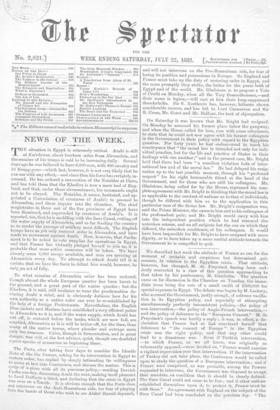We described last week the attitude of France as one
for the moment of irritable and suspicious but determined qui- escence, in relation to the Egyptian crisis. That attitude, however, has changed, M. de Freyeinot having been sud- denly converted to a view of this question approaching to that taken by his' predecessor, M. Gambetta. The question came on for discussion in the Chamber on Tuesday, the imme- diate issue being the vote of a small credit of £300,000 for special expenses in Egypt. The debate was begun by M. Lockroy, who accused the Government, justly enough, of extreme vacilla- tion in its Egyptian policy, and especially of attempting simultaneously perfectly inconsistent policies,—the policy of non-intervention,—the policy of Anglo-French intervention,— and the policy of deference to the "European Concert." M. de Freycinet's speech was hardly a reply ; it was, in effect, a de- claration that Prance had at last convinced herself that deference to " the concert of Europe " in the Egyptian crisis was the right policy, and that any other would lead to a disastrous war. Even if Turkish intervention, —to which France, as we all know, was originally so vehemently opposed,—were decided on, "France would exercise a vigilant supervision over that intervention. If the intervention of Turkey did not take place, the Conference would be called upon to study the question of a European intervention ; and if France were comprised, as was probable, among the Powers requested to intervene, the Government was disposed. to accept that mandato, on condition that it should be clearly defined. The Suez Canal could not cease to be free ; and if other nations established themselves upon it, to protect it, France must be with them." An agreement with England on the subject of the Suez Canal had been concluded on the previous day. " The English alliance and the European concert" were the two guiding principles of M. de Freycinet's action.



































